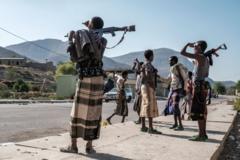The Tigray People's Liberation Front (TPLF), the main opposition party in Ethiopia, has urged the African Union to mediate with the federal government following a recent decision by the National Election Board of Ethiopia to revoke its legal status. The board's decision, made on Wednesday, prohibits the TPLF from engaging in any political activities due to its failure to hold a general assembly, heightening tensions in a region recently marked by conflict.
The TPLF labeled the ban as "dangerous," asserting it threatens the fragile 2022 peace agreement that put an end to a devastating two-year civil war in northern Tigray, which claimed tens of thousands of lives and displaced millions. The ban follows a period of political strife in Tigray and comes in anticipation of nationwide elections expected by June 2024.
Historically, the TPLF has played a prominent role in Ethiopian politics, previously governing the country after a 1991 coup until Prime Minister Abiy Ahmed assumed power in 2018. Since then, the TPLF has faced increasing marginalization and internal division, complicating its ability to hold internal elections.
In response to the electoral board's ban, the TPLF has appealed for the African Union's involvement to pressure the federal government to reconsider its decision. The party insisted that the ban violates the rights established in the Pretoria Agreement, which recognizes the legitimacy of both parties involved and advocates for political resolutions through dialogue.
TPLF deputy chairman Ammanuel Assefa expressed concerns that the electoral board's decision could jeopardize the Pretoria Agreement, stating, “This isn't just about TPLF, but also about undermining what people have sacrificed.” Delays in fulfilling the agreement's terms, including the return of approximately one million displaced individuals, contribute to rising apprehensions regarding potential violence in Tigray.
International observers, including the United States, United Kingdom, and the European Union, have cautioned against escalating tensions, emphasizing the need for peaceful resolutions to avoid a relapse into conflict. As the political climate remains fraught, the TPLF's future and the broader peace process in Ethiopia hang in the balance.




















